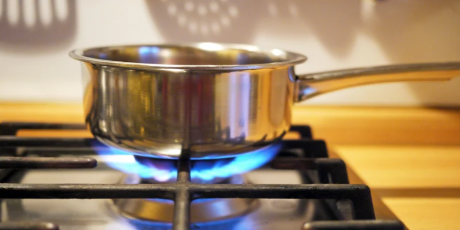The Russian energy crisis and Ireland's reliance on fossil fuels 09 Mar 2022

Analysis: fossil fuels meet 85% of Ireland's energy needs and we can see the consequences of Russian actions in our heating and electricity bills - Dr. Paul Deane, Senior Research Fellow - MaREI Centre/Environmental Research Institute
The illegal invasion of Ukraine by Russia has demonstrated how Europe's reliance on fossil fuels can be used as political leverage by one nation's quest for imperialist goals. As one of the most fossil fuel dependant countries in Europe, Ireland is not immune to this reliance. The war in Ukraine should serve as a reminder that Ireland is a country that uses huge amounts of energy and yet produces so little.
Fossil fuels meet 85% of Ireland's energy needs. Oil refined into diesel and petrol is prolific across our economy, meeting half of our energy needs and fuelling cars, trucks and buses. It is the most common fuel across the country for heating homes, while natural gas is an important fuel in electricity generation and heating.
Most of our oil is sourced from the UK, the US and Norway, with small volumes from Russia and other locations. Our secondary fuel, natural gas, is sourced mainly from Norway and the UK. While Ireland does not physically import gas from Russia, we do see the consequences of Russian actions in our heating and electricity bills which are passed through on global markets.
Our research in UCC have shown that it is possible for Ireland to move away from fossil fuels. However, due to the significant human and financial effort involved, the shift would likely take two to three decades to successfully complete. Ireland has had strong success in producing clean electricity from renewables such as wind. However, its contribution to overall energy use today is small because most heavy energy use in our economy, such as cars, trucks and heating systems, don’t yet use electricity.
The major challenge in moving away from fossil fuels relates to how energy is consumed across our economy rather than how it is produced. We have over two million vehicles, over one and a half million houses and a quarter of a million businesses that use fossil fuels for the movement of goods and people, heating and manufacturing.
Switching equipment, cars, and heating systems away from fossil fuels takes time due to the slow turnover of stock, such as car sales per year; the large number of people involved who must invest and the significant human capital needed to deliver it. For example, only 1,600 home heating systems switched away from fossil fuels in 2021. The government has plans to increase this to 75,000 per year, but the scale of the challenge becomes apparent when you consider that over 1 million homes must be targeted.
Moving away from fossil fuels quickly is very much dependant on the availability of skilled workers. Plumbers, electricians, builders and carpenters are needed to install new heating systems, charging points and new infrastructure. Ireland needs a targeted drive for skills and trades across schools and communities to deliver on this.
At a Government level, the most important action for reducing fossil fuel use is the successful delivery of the overlapping Climate Action Plan which will cut fossil fuel use by 40% by 2030. This involves ambitious delivery of electric vehicles, home heating systems and increased renewables. As well as accelerating the role of current renewables such as wind and solar we also need to look at other renewables in Ireland. Recent research from SEAI demonstrates that farmers can use agricultural land to produce renewable gas that would replace 10% of current gas needs, thus moving agriculture from a climate challenge to an energy solution.
At a financial level, the Government already offer generous grants and assistance for electric cars and clean home heating options. These measures make clear financial, social, and environmental sense and you should access them if you can afford them. At the same time, the most vulnerable and those who can’t afford these options need to be protected and shielded from costs. On this issue, the Government needs to look at targeted energy rebates to homes under financial stress while also providing financial options for homes to move away from fossil fuels.
"Moving away from fossil fuels quickly is very much dependant on the availability of skilled workers"
At an individual level, we are all responsible for our own personal consumption. Any effort by people who are healthy and well to drive less, cycle or walk more, turn down our heating, wash clothes at lower temperatures and use less electricity will all have beneficial impacts.
These impacts are generally small at a national level in terms of overall fossil fuel consumption, but the habits and practices they engrain can endure. For example, the Dutch government banned private motor vehicles on Sundays to curb oil consumption during the 1970s' oil crisis. This in part led to a culture of cycling which has lasted today in the Netherlands. The terrible events in Ukraine should not paralyse us into inaction and instead should be a catalyst to address one of Ireland’s most vulnerable security risks, namely our massive reliance on fossil fuels.